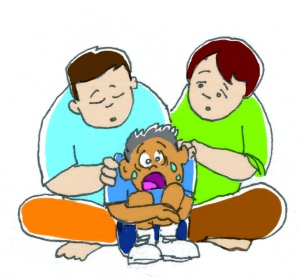When my husband and I started the adoption process, we attended a disclosure talk at Fei Yue Community Services. While it had always been our intention to be transparent about adoption, we’d never realised just how important it was to keep an ongoing dialogue on adoption open between parent and child during the crucial growing-up years. This is why The Adventures of Squirky the Alien book series has a Q&A section for adoptive parents on this topic. Because we feel that it’s that important, we’re reproducing this Q&A online here as well.
 Why must we discuss adoption openly with our child?
Why must we discuss adoption openly with our child?
It’s about building trust in your parent-child relationship. Your child has a right to know. Not talking openly about adoption implies secrecy and a sense of shame, but your child should feel safe and open in voicing out feelings and questions about being an adoptee. At the same time, as parents, it is most ideal if you are the first ones to share adoption information and have control over this information. Initiate an open and ongoing conversation about adoption with your child.
 At what age should we tell our child that he or she is adopted?
At what age should we tell our child that he or she is adopted?
Most resources recommend three years old as an appropriate age. Some parents choose to start earlier than three years to ‘practise’ and gain confidence in talking about adoption. When children are exposed to positive adoption terms such as “tummy mummy” (as opposed to “real mummy”) and “forever mummy” (as opposed to “adoptive mummy”) from a very young age, such a frame of reference becomes a natural part of your family’s language.
 How do we respond to our young child who wants to search for his/her birth parents?
How do we respond to our young child who wants to search for his/her birth parents?
Acknowledge your child’s desire to search. Find out more what is behind this eagerness to search for the birth parents and address those underlying concerns. Assure your child that when he or she is older, you will definitely help in this search. All information about your child’s adoption history should preferably be disclosed by the age of twelve. If you’re unable to answer queries your child might have on the birth parents, it’s perfectly fine to say, “I am sorry, I don’t have all the answers. But we can try to find out together if this is important to you.”
 What if our child does not regard us as the “real” parents after finding out about the birth parents?
What if our child does not regard us as the “real” parents after finding out about the birth parents?
This is why early disclosure of adoption is important—the child grows up knowing that he or she has two sets of parents, and both sets of parents are real parents. The relationship between adoptive parents and child is not replaceable. But the existence of and connection to birth parents are not things to be denied either.
 How can we comfort our child when he or she expresses loss or grief in being adopted?
How can we comfort our child when he or she expresses loss or grief in being adopted?
Provide the space for your child to grieve and be sad, and assure him or her of the permanence of your adoptive family. Become that safe place when your child is at his or her lowest point. Allow your child to miss the birth family even though your child might not have met them. As adoptive parents, please do not see your child’s sense of loss for the birth family as a symptom of not feeling loved and connected with your family; these are two separate issues.
 What are some ways to reassure our child that he/she is unconditionally loved even if we are not biologically related?
What are some ways to reassure our child that he/she is unconditionally loved even if we are not biologically related?
Love your child as you would in any typical parent-child relationship: strike a balance between love and setting boundaries, provide a safe and nurturing environment, and build a stable marriage. It is important to note that while you should remain sensitive to adoption issues, you should not overcompensate.
Information adapted from Touch Family Services Ltd, Singapore, as well as input from Chang Chee Siah, Nicole Soojung Callahan, Wong Wei Lei and Andrea Yee. Illustrations by David Liew.

